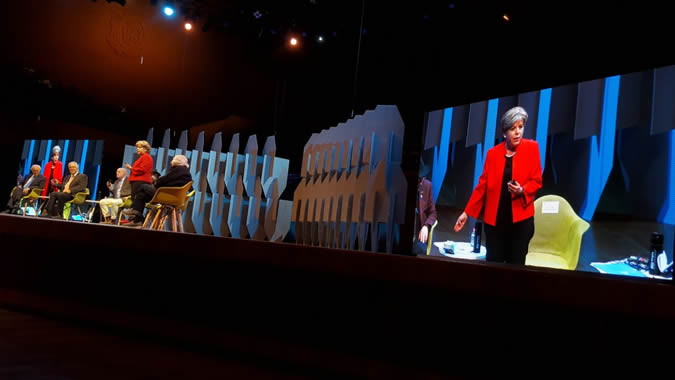Alicia Bárcena Reaffirms Need for a New Development Model at High-level Forum alongside Noam Chomsky and Nobel Prize Winner Mario Molina
Work area(s)
ECLAC’s Executive Secretary participated in Mexico City in the international forum “The Siege Upon Civilization: From Wall to Wall,” held at the UNAM’s main campus.

“Latin America and the Caribbean needs to move toward a new development paradigm based on equality and environmental sustainability as the drivers of growth. The current model, capitalism, doesn’t work,” Alicia Bárcena, the Executive Secretary of the Economic Commission for Latin America and the Caribbean (ECLAC), stated this Wednesday, November 15, at a high-level forum held in Mexico City.
Bárcena participated in the opening session of the international forum The Siege Upon Civilization: From Wall to Wall – organized by the National Autonomous University of Mexico (UNAM) and the University of Guadalajara (UDG) – where participants debated the Origins Project: Climate change, the environmental and social consequences for Mexico and the world, carried out by Arizona State University (ASU).
At the debate, ECLAC’s Executive Secretary was joined by prominent figures: Lawrence Krauss, Professor at ASU’s School of Earth and Space Exploration and Director of the Origins Project; Noam Chomsky, linguist, philosopher, cognitive scientist, historian, social critic and activist, as well as Emeritus Professor at the Massachusetts Institute of Technology (MIT); Richard Somerville, meteorologist and Distinguished Emeritus Professor at the Scripps Institution of Oceanography of the University of California; Dan Schrag, Professor of Environmental Science and Engineering and Director of the Center for the Environment at Harvard University; and Mario Molina, a Mexican chemist, co-recipient of the 1995 Nobel Prize in chemistry and current Professor at the University of California at San Diego.
During the event, Alicia Bárcena explained that multilateralism is the only system that permits us to work for the people. “We are in a change of era, with tectonic shifts occurring: migration, climate change, major geopolitical movements in the world, a fourth industrial revolution based on technology, and we don’t know what is going to happen with the future of work,” she said.
She added that today there is an urgent need to make a big environmental push that favors carbon-free production and consumption. “We are not afraid to move toward a model with a progressive vision, with universal access to basic goods, to social rights, to equality, because inequality conspires against democracy,” the senior United Nations official sustained.
Bárcena, who is also a biologist by profession, recalled the tragic consequences that climate change has had for the region since, in addition to losses in biodiversity and environmental pollution, natural disasters have accumulated a cost of $300 billion dollars from 1970 through 2017.
Along with underlining that climate change “is the biggest market failure ever,” the international official indicated that while globalization has helped pull millions of people out of extreme poverty, inequality has increased in an alarming way.
“Currently, 1% has half of the income of the rest of the world’s population. Wealth is concentrated in very few hands,” she stated. Citing the most recent study of OXFAM, Bárcena said that a mere eight individuals have the wealth equivalent to 3.6 billion people. In addition, tax evasion in Latin America and the Caribbean totals $340 billion dollars (or 6.7% of GDP). “This is an example of the culture of privilege that we must eradicate,” she reiterated.
“Who is going to lead the world in the coming years?” ECLAC’s Executive Secretary asked the audience gathered at the UNAM’s main campus. “The elite, or the people? Let’s change the world with the 2030 Agenda for Sustainable Development, with citizen participation. You, above all the young people, can change the world.”
Subregional headquarter(s) and office(s)
Type
Country(ies)
- Latin America and the Caribbean
Contact
Public Information Unit
- prensa@cepal.org
- (56 2) 2210 2040